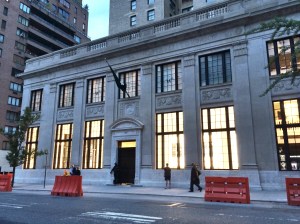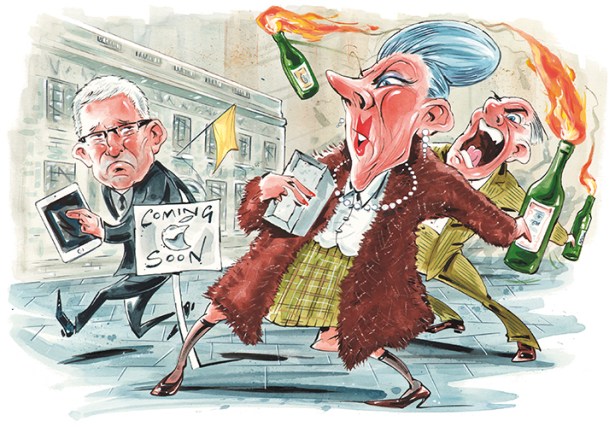Upper East Siders Are Enraged at a New Apple Store. Maybe Apple Should’ve Tried Brooklyn First.
By Terence Cullen June 17, 2015 10:45 am
reprints
Last weekend, one of the chichiest neighborhoods in the country (the Upper East Side) saw one of the most expensive retailers in the world (Apple) open a store at 940 Madison Avenue in a splendid, restored bank.
Locals reacted with anger, outrage and a lawsuit.
Huh?
If it sounds like a bit of a head scratcher, maybe that’s because it is, at least for those of us not ensconced in the gilded cocoon of Madison Avenue between East 60th and East 80th Streets. An Apple store is one of the most coveted retail brands a neighborhood can ask for.
Still, local resident Herbert Feinberg felt alarmed enough by this tech-invader that earlier this month he filed a 16-page lawsuit in the Manhattan Supreme Court to stop the store’s opening after his previous effort (called Saving the 74th Street Residential Effort) didn’t go anywhere. He cited long lines and late hours as the reason Apple didn’t belong on Madison Avenue.
“Bring the lines to Brooklyn!” said Carlo Scissura, the president of the Brooklyn Chamber of Commerce. “Why Apple would need the Upper East Side makes no sense. They don’t want you. We want you, come here.”
Like a case of mismatched suitors, the Upper East Side may spurn Apple, but Brooklyn is waiting anxiously by the iPhone.
Brooklyn’s desire is only inflamed by openings in other areas. Every borough (aside from the Bronx) has been visited by an Apple. Apple is reportedly opening a store at the Queens Center Mall in Elmhurst—which will become Apple’s largest mall location in the state, according to the Apple fan blog, 9to5Mac.com. And the Staten Island Mall has an Apple store.
Apple stores can be an economic windfall for a neighborhood, said Adelaide Polsinelli, a senior managing director at Eastern Consolidated who heads its retail sales division. She pointed to the multi-level, 15,000-square-foot store in Grand Central Terminal, which opened in late 2011, and said it was a major “value add” for the landmarked terminal. The Soho store, at 103 Prince Street, tripled the value of the neighborhood, she said, and even side-street retail is flourishing. And Brooklyn has long sought a piece of the action.
“If Apple is coming, it’s not only a game changer, it’s a good game changer,” Ms. Polsinelli said. “If you look at any location Apple is in, what’s the negative? It brings economic values and population change for good.” (Mr. Feinberg: She’s talking to you.)

In 2010, then-Brooklyn Borough President Marty Markowitz put out a video in which he emailed Apple co-founder Steve Jobs (on an iPad, by the way) about bringing a store to the city’s most populous borough.
Rumors have circulated for years that Apple has been planning a store in Williamsburg at 247 Bedford Avenue. The New York Post reported in September that the company had signed a lease for 20,000 square feet at the site, but no one involved in the deal would comment. Ms. Polsinelli said she recently sold a portfolio in the neighborhood “and part of the cachet was Apple is coming.”
Mr. Scissura, the Brooklyn Chamber president, and others said Apple’s move is a long time coming, after shopping around for several locations including Williamsburg, as well as Downtown Brooklyn and the Atlantic Yards near the Barclay’s Center. Their argument for opening an Apple store has been that the lion’s share of its shoppers live in the borough, and there are a growing number of technology companies coming to areas such as Industry City in Sunset Park.
“We’ve achieved so much, Apple should be here,” Mr. Scissura said. “Not just for the borough, but for Apple also.”
Tucker Reed, the president of the Downtown Brooklyn Partnership, also said Apple might be great for Brooklyn, but its impact might not be what it could have been five years ago. If the company does come, he said, it had better be soon.
“There are plenty of good sites for them,” Mr. Reed said. “But they better hurry cause we’re running out of land here.”
As for the Upper East Side locale, Apple is walking into a mix of retailers with names on the awnings like Gucci and Christofle, and where a $2,000 computer doesn’t look so obscenely expensive next to a $3,000 pair of Louboutin shoes. And perhaps it isn’t Apple’s long lines that make residents like Mr. Feinberg so uncomfortable—it’s more the eau de hipster.
“If [Apple customers] operate in the same manner that they are operating at … elsewhere, it’s not going to be appropriate in this area,” said Norman Arnoff, Mr. Feinberg’s lawyer, who filed the lawsuit. “It’s going to generate tremendous problems in terms of traffic and also long lines of people and it’s going to constitute a nuisance.”
‘There are plenty of good sites for them [in Brooklyn]. But they better hurry cause we’re running out of land here.’ —Tucker Reed, Downtown Brooklyn Partnership
At this point, Mr. Arnoff told CO, the 89-year-old Mr. Feinberg wants residents to sit down with Apple (a meeting earlier this year didn’t pick up traction, he added) to discuss a compromise. (In fairness to Mr. Feinberg, Apple doesn’t seem to have much patience with pesky outsiders. They did not return calls for this article.) If Mr. Feinberg and others get assurance there won’t be Apple lovers camping out or noise coming from the store, the lawsuit goes away.
“He’s not against Apple,” Mr. Arnoff said. “He’s only against what they may do in the neighborhood if they do it as [they do] in other areas.”
There are also concerns about food carts looking to capitalize on hungry tech lovers who stand overnight in line to get their hands on the next innovative gadget. Not to mention the later hours Apple stores keep (most are open until 9 p.m. on Monday through Saturday, according to Apple’s website), compared with other businesses in the mostly residential area, according to the lawsuit. (The Upper East Side Apple store closes at 8 p.m. on Monday through Saturday, an hour earlier than most of its other Manhattan stores, its website indicates.)
There could be, however, some benefits to those long lines in a neighborhood that’s stayed historic and consistent throughout the years, Ms. Polsinell said.
“It’s not like the line of people are bad people,” she said. “Those are the people who are going to look around and say ‘Hey, I want to live here.’ Apple is not affordable for everyone, but certainly the ones coming to an Apple store—they’re people who do want to come to a neighborhood.”




